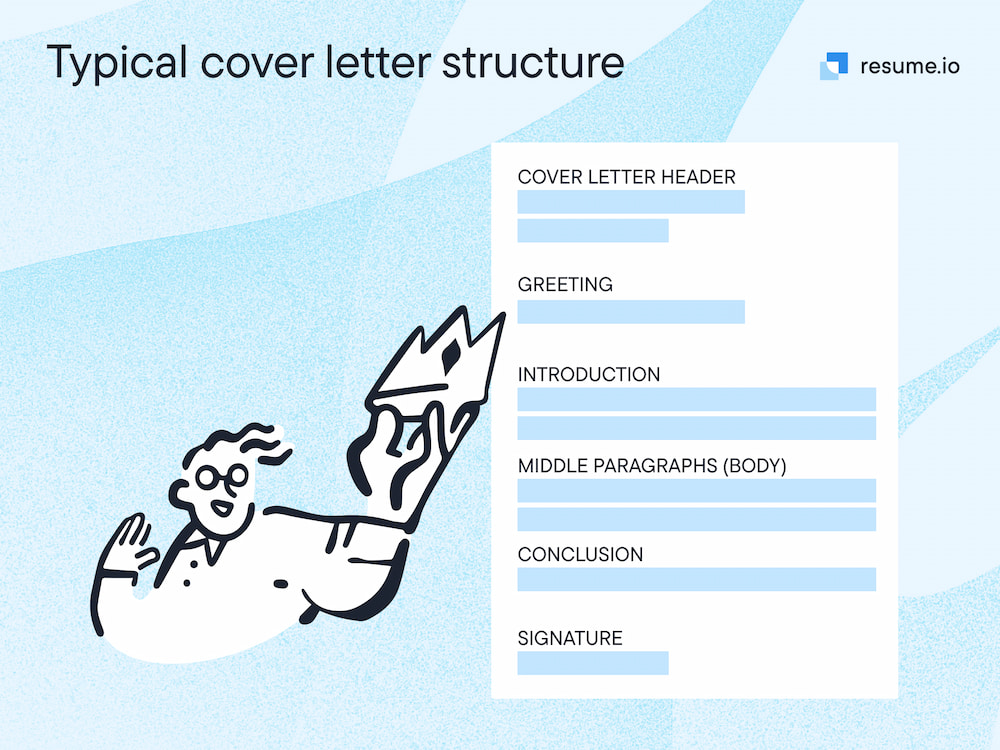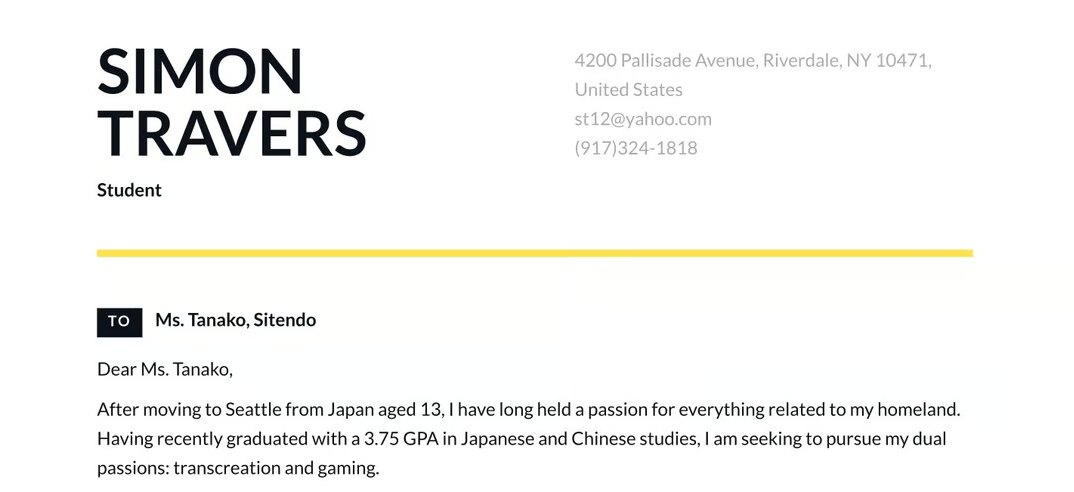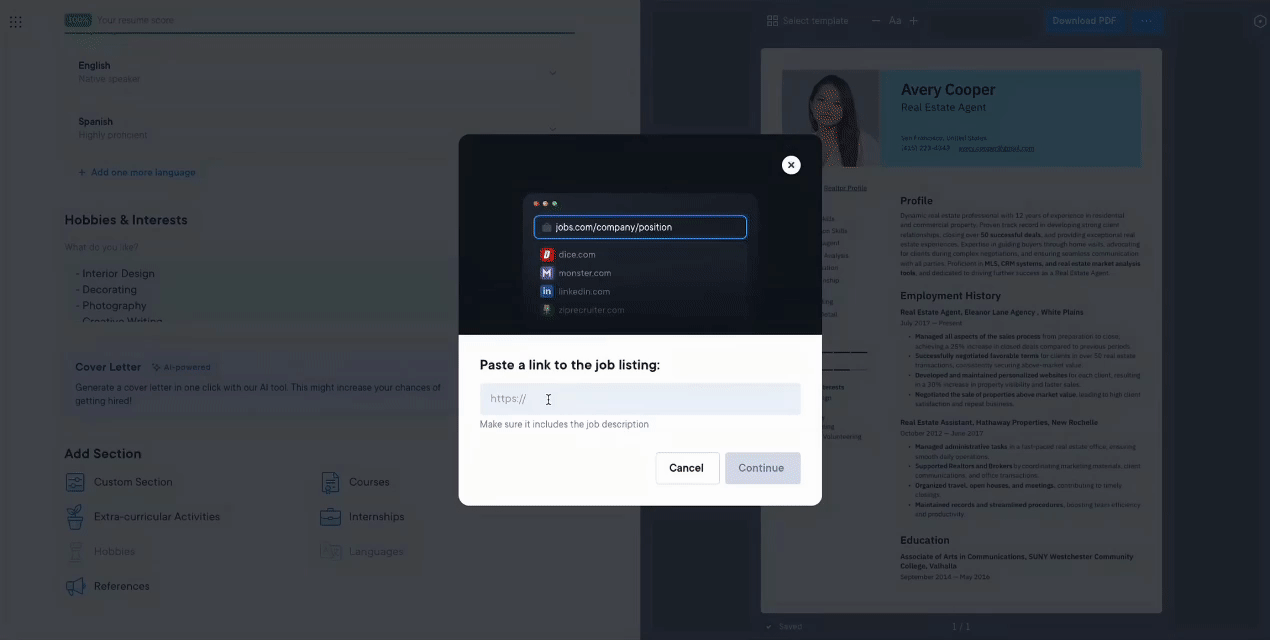A thoughtful cover letter is one of the best advantages you can give yourself when applying for jobs without professional experience. It’s a valuable tool that allows you to explain your motivations, strengths, and goals.
View that blank page as an opportunity to begin your story. We’ll show you how to write a cover letter with no experience that convinces a hiring manager to give you a chance.
Cover letter templates for no experience
If you need some inspiration for how to write a cover letter with no experience, check out these cover letter templates:
Entry-level
Singapore template
Student
Madrid template
Career change
Sydney template
Tips for writing a cover letter with no experience
When applying for your first job or switching careers, you may wonder if it’s worth writing a cover letter if you don’t have any relevant work experience. The truth is that a cover letter becomes even more important when you haven’t worked in the job or industry before.
In a cover letter, you can explain to an employer why you’re the best candidate—even without experience.
Your cover letter should have a clear structure, so it’s easy for a hiring manager to follow. It should include these elements:
- A cover letter header with your name and contact information
- A greeting
- An introduction
- A body
- A conclusion with a call to action
- A professional sign-off

For more information, read our expert guide on how to write a cover letter.
Step 1#: Start with a strong opening

Hiring managers review applications quickly, so your cover letter needs to grab their attention right away. Your introduction should convince the hiring manager to keep reading even though you lack professional work experience.
Start your cover letter by mentioning the specific position you’re applying for and the company’s name. You should also express your interest in working for the company. Review the organization’s website or social media pages so you can customize your opening.
For example, you can highlight a value that you share with the company, such as a commitment to sustainability.
Address the hiring manager by name
Instead of using an outdated greeting like “to whom it may concern,” address the hiring manager by name. If you can't find their name, look on the company’s website or social media platforms. You can also call the company to ask for the hiring manager’s name.
If someone in the company referred you to apply for the position, you should also mention their name in the first paragraph. A mutual connection can give your application a boost. Just make sure you get the person’s permission to use their name in your letter.
Follow this example to write a strong opening paragraph:
Dear Teresa Jones,
I’m excited to apply for the customer service representative role at Brookline Solutions. As someone who believes in providing support for others, I admire Brookline’s commitment to building genuine relationships with its customers. Additionally, I was referred to the position by Alex Thompson, who spoke highly of the company’s dedication to professional growth and development.
Step 2#: Emphasize transferable skills
Without experience, your cover letter should focus on the transferable skills you can bring to the new role. These include the traits or abilities you’ve developed from school, volunteer work, or extracurricular activities.
For example, some common transferable skills to highlight on a cover letter with no experience include:
- Communication skills
- Teamwork
- Time management
- Organization
- Flexibility
- Leadership
- Computer and technology skills
Think about situations where you’ve used these skills and how those experiences may help you in a professional environment. If you served as your school’s student body president, for example, you probably know how to lead teams, deliver presentations, and manage conflicts. Mention those skills in your cover letter and discuss how you plan to use them in the position.
Here’s an example showing how you can emphasize your transferable skills:
As the president of my school’s student body, I used my leadership skills to organize events for diverse student groups and manage budgets up to $5,000. While coordinating teams, I made sure everyone’s voice was heard to facilitate collaboration. Additionally, I was able to balance my extracurricular commitments and my schoolwork by using effective time management strategies to stay on task.
Step 3#: Share your passion and motivation
Hiring managers understand that everyone has to start somewhere. If they see a candidate with no experience, they want to know what motivated them to apply for the role. In your cover letter, explain why you’re passionate about the field or position.
Be genuine when discussing your interest in the role. Share an example or tell a story about why you’re excited to work in the industry. For example, if you’re applying to be a receptionist at a veterinary clinic, you can write about the love of animals you developed while growing up on a farm.
You can also try these other approaches for discussing your passions in a cover letter:
- Explain how a moment in your life led you to choose this career.
- Share how your personal values align with the role.
- Connect your natural skills or abilities to the position.
- Mention a role model, mentor, or other influential person who inspired you to join the field.
Check out this example below:
I’ve been passionate about technology since I took a high school coding class, where I developed an app to track my homework due dates. The experience showed me how technology has the power to simplify everyday tasks and processes. I’m excited to apply for the software development position because it will allow me to use my passion to create meaningful solutions for users.
Step 4#: Focus on your willingness to learn
Employees who are motivated and willing to learn can quickly overcome a lack of experience. Mention your eagerness to learn and grow in the new role. Provide an example of another time when you had to adapt quickly in a new environment.
You should also highlight any proactive steps that you’ve taken to learn about the industry or position. These steps show an employer that you take initiative to learn and develop new skills, which is a valuable trait in any employee—with or without experience.
Some learning opportunities you can mention in your cover letter include:
- Degrees or certifications you’ve earned in the field
- Relevant classes you’ve completed
- Industry workshops, seminars, or conferences you’ve attended
- Professional organizations you’ve joined
- A mentorship program with someone in the industry
- A job-shadowing experience
- Volunteer work
- Resources you’ve used to learn about the industry, such as podcasts, books, or newsletters
Review this example of a cover letter that shows a willingness to learn:
While this would be my first professional experience as a marketing assistant, I’ve demonstrated my ability to learn quickly and adapt to various tasks as a volunteer coordinator at a local nonprofit. There, I was able to increase volunteer sign-ups in only three months after applying myself to the task and asking for assistance from more experienced colleagues when needed.
Step 5#: Provide an engaging closing statement
End your cover letter with a professional closing statement. In a few sentences, restate your excitement about the position. Summarize the contributions you can make to the team, including your transferable skills, willingness to learn, and passion for the role.
Your last paragraph should also include a call to action for the hiring manager to contact you. Politely ask to meet with the employer for an interview and provide your contact information. Sign off with a professional salutation, such as “Sincerely” or “Respectfully,” followed by your signature.
How long should a cover letter be?
Generally speaking, a cover letter should be between 200 and 400 words. It should fit on one page. If you have trouble writing concisely, check out these short cover letter samples you can use.
Here’s an example of how to end a cover letter with no experience:
I would jump at the chance to put my strong communication skills and passion for learning to work for Harpsmith Technical Solutions. I hope to meet with you soon to discuss my qualifications in more detail. You can reach me at [phone] or [email]. Thank you for your consideration, and I look forward to hearing from you soon.
Sincerely,
[Your Name]
Discover more tips for writing a great cover letter in our comprehensive guide.
Cover letter with no experience examples
Don’t get stuck on a blank page. Use these cover letter examples to get some ideas for writing your own:
First job cover letter example
High school student cover letter example
Internship cover letter example
Career change cover letter example
Frequently asked questions
Here are the answers to other frequently asked questions about how to write a cover letter with no experience:
How to write a cover letter for a job with no experience in that field?
Focus on the transferable skills you’ve gained in another field or through different experiences, such as school or volunteer work.
Connect those skills to the position to show that you understand what it takes to succeed. Explain why you’re pursuing the new industry and what motivated you to apply for the role.
How do you use AI to help write your cover letter with limited experience?
Artificial intelligence (AI) tools can suggest ways to align your skills and personality traits with a position. Some AI tools, such as our Cover Letter Builder, can even help you customize your letter based on the job description.

If you use AI technology to write your letter, make sure to edit the AI-generated copy so that it sounds like you wrote it and utilizes the most effective keywords.
Should you talk about lack of experience in a cover letter?
It’s fine to mention your lack of experience in a cover letter, but don’t dwell on it. Instead, focus on the desirable traits and skills you can bring to the position, such as an eagerness to learn or a passion for the field.
Even if you lack experience, your cover letter should sell your skills and show employers why you’re right for the job.











